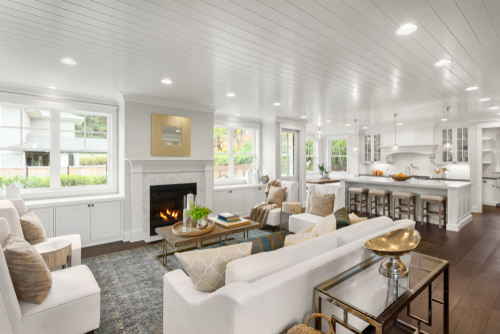 It is no secret that buying a home is one of the biggest purchases you will make in your lifetime. And with the right real estate agent and professional guidance, it can also be one of the most exciting times for you and your family as you navigate the home buying process.
It is no secret that buying a home is one of the biggest purchases you will make in your lifetime. And with the right real estate agent and professional guidance, it can also be one of the most exciting times for you and your family as you navigate the home buying process.
There are a lot of factors to consider when you begin looking at potential homes in Omaha, NE, which is why we have outlined some things for you to look for and think about when you begin your search:
How many bedrooms and bathrooms do you need?
Consider how many bedrooms and bathrooms you will need for the next decade – are you planning on growing your family, do you have children leaving for college soon, will you be caring in-home for elderly parents, do you need a home office or gym? These are all factors to consider when figuring out your ideal bedroom and bathroom count.
Does your current (or future) situation call for a single-story home?
If you have anyone in your household that will have an issue utilizing a staircase then it may be better to opt for a single-story home. This may include small children, elderly parents, guests with physical limitations or if you simply are planning on growing older in the home yourself and foresee a staircase being an inconvenience.
How much storage space do you need?
Storage space can be an afterthought for many people when it comes to looking for a home – that is, until they move in! If you are someone who needs a lot of storage it is important to note that for your realtor prior to your search. You can also always get creative and find different ways to create storage areas if needed, but it is important to have that on your list if it’s important to you. Also, be sure to take into consideration garage space if you need to accommodate multiple vehicles.
What does your ideal yard look like?
Some people dream of a spacious backyard to host summer BBQ’s and birthday parties, others want a low maintenance property with little upkeep. And some families fall in the middle.
What are you looking for in a neighborhood?
What neighborhood you live in can impact many things such as commute times, school districts, distance to local conveniences, walkability, accessibility to amenities, etc. It is important to think about this off the bat, so you don’t waste time touring potential homes in areas that do not meet your needs and wants.
Do you want to do repairs and renovations?
Some people are open to (and even get excited about) the thought of home repairs and renovations as it allows them to put their own personal touch and incorporate their style into the property. Others run far and fast when renovations are muttered in a sentence and want a move-in ready home. Which do you prefer?
Whether you relocating to Omaha, NE or simply moving neighborhoods, be sure to check out our Home Buying Tips page here!
 Real estate terminology can really throw you for a loop, especially if you are a first-time home buyer and haven’t dealt with the home buying process before. If you can relate, then we are sure you will enjoy (and benefit from) today’s blog post!
Real estate terminology can really throw you for a loop, especially if you are a first-time home buyer and haven’t dealt with the home buying process before. If you can relate, then we are sure you will enjoy (and benefit from) today’s blog post!  If you are a first-time home buyer you may come across words or phrases during the buying process that you are unfamiliar with, thus causing a level of confusion and unnecessary stress. Two of those terms may be pre-qualified and pre-approved – and while they sound similar, it is crucial that you understand the differences.
If you are a first-time home buyer you may come across words or phrases during the buying process that you are unfamiliar with, thus causing a level of confusion and unnecessary stress. Two of those terms may be pre-qualified and pre-approved – and while they sound similar, it is crucial that you understand the differences. If you are looking to purchase your first home in Omaha, NE then you won’t want to miss today’s blog post!
If you are looking to purchase your first home in Omaha, NE then you won’t want to miss today’s blog post!  As if the process of moving isn’t difficult enough, adding children into the mix can be a daunting and stressful recipe. But with the right preparation and planning you can make it a fun and exciting journey for your whole family to enjoy. That is where we come in!
As if the process of moving isn’t difficult enough, adding children into the mix can be a daunting and stressful recipe. But with the right preparation and planning you can make it a fun and exciting journey for your whole family to enjoy. That is where we come in! Many people are attracted to older homes due to their character, charm and unique design elements, and much prefer this purchase over a newer, more modern property. And while all homes have their fair share of upkeep and issues from time to time, older homes are more prone to costly renovations and repairs.
Many people are attracted to older homes due to their character, charm and unique design elements, and much prefer this purchase over a newer, more modern property. And while all homes have their fair share of upkeep and issues from time to time, older homes are more prone to costly renovations and repairs.  It is no secret that buying a home is one of the biggest purchases you will make in your lifetime. And with the right real estate agent and professional guidance, it can also be one of the most exciting times for you and your family as you navigate the home buying process.
It is no secret that buying a home is one of the biggest purchases you will make in your lifetime. And with the right real estate agent and professional guidance, it can also be one of the most exciting times for you and your family as you navigate the home buying process.  No matter if it’s your first or sixth time purchasing a property, the process of buying a home can be exciting, stressful and seem like a roller coaster of mixed emotions. And while we live in a digital age, it is important to know that the internet will not replace the guidance and expertise of a knowledgeable real estate agent during your home buying journey in beautiful Omaha, NE.
No matter if it’s your first or sixth time purchasing a property, the process of buying a home can be exciting, stressful and seem like a roller coaster of mixed emotions. And while we live in a digital age, it is important to know that the internet will not replace the guidance and expertise of a knowledgeable real estate agent during your home buying journey in beautiful Omaha, NE.  Whether you are relocating to Omaha, NE from another state or just moving minutes up the road, there are a few key factors to consider when choosing a new neighborhood to settle into. And since narrowing down a part of town you want to be in can be tricky, we have listed a few things to keep in mind and research before deciding on an area:
Whether you are relocating to Omaha, NE from another state or just moving minutes up the road, there are a few key factors to consider when choosing a new neighborhood to settle into. And since narrowing down a part of town you want to be in can be tricky, we have listed a few things to keep in mind and research before deciding on an area: We understand just how stressful the home buying journey can be – from setting a budget to finding your perfect neighborhood, to touring potential houses and finally landing the home of your dreams – it is a process to say the least! But when the finish line is finally in sight you don’t want to forget one crucial step, the final walkthrough.
We understand just how stressful the home buying journey can be – from setting a budget to finding your perfect neighborhood, to touring potential houses and finally landing the home of your dreams – it is a process to say the least! But when the finish line is finally in sight you don’t want to forget one crucial step, the final walkthrough.  There are few events in life more exciting, momentous and nerve-racking than buying your first home. You may be combing the web for the ideal school district or find yourself driving around neighborhoods trying to picture which cul-de-sac you could settle into. However, there are also moments where, especially for first time home buyers, you may feel overwhelmed and confused by the process.
There are few events in life more exciting, momentous and nerve-racking than buying your first home. You may be combing the web for the ideal school district or find yourself driving around neighborhoods trying to picture which cul-de-sac you could settle into. However, there are also moments where, especially for first time home buyers, you may feel overwhelmed and confused by the process. 








